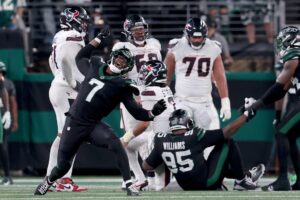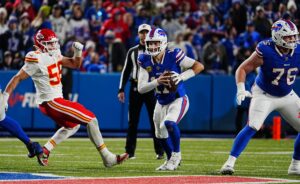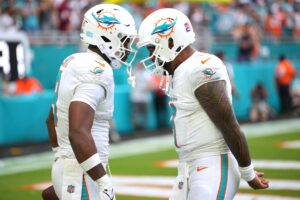The New England Patriots are officially 89 days away from kicking off their 2019 season. New England is one of the most storied franchises in the league, and their recent success makes it easy to overlook some of the earliest legends in the franchise. One of the earliest Boston Patriots, Houston Antwine was one of the greatest pass-rushing threats of his era.
Houston Antwine: Six Feet of Pure Pass Rush
Before the Patriots
In the mid-1950s, the Southern Illinois University Salukis had a size problem. Carver Shannon, a running back at SIU, explained the problem: “My first years at Southern Illinois most of the linemen were my size. I told [SIU athletic director Donald] Doc [Boydston] we needed to recruit some big linemen.” Shannon, who stood at 6’1″ and less than 200 pounds, pointed Boydston south toward Tennessee, where he had heard there was plenty of size and talent to go around.
Antwine soon found himself a Southern Illinois Saluki and quickly cemented himself as the best two-way lineman in SIU history. His size—6’0″ tall, 270 pounds—made him an immediate improvement to both the offensive and defensive lines. During his college career, he flashed quickness and incredible on-field intuition, a skill that significantly helped Shannon’s college career as a running back. Antwine was an incredible wrestler, finishing second and first in consecutive NAIA heavyweight national championships in 1959 and 1960, and his strength and elusiveness translated well to the pass rush.
He was no stranger to accolades during his college career. He was awarded Interstate Intercollegiate Athletic Conference First-Team honors during his freshman, sophomore, and senior seasons. When the Salukis won the IIAC title in 1960, Antwine was named MVP and was voted an AP All-American second-teamer.
1961 Draft
Antwine was a well sought-after player by both the AFL and the NFL pre-merger. The Detroit Lions drafted him in the third round of the NFL draft with the 38th overall pick. However, Antwine chose to sign with his AFL drafters, the Houston Oilers (now the Tennessee Titans). The Oilers selected him 64th overall in the eighth round of the 1961 AFL Draft.
Before he had even played a snap, he was traded to the Boston Patriots for a third-round draft pick in the 1962 Draft.
As a Boston Patriot
His skill set made him an integral part of the Boston Patriots roster, appearing in 142 games in 11 seasons. In 1963, the Patriots won their first division championship on the road against the Buffalo Bills. New England Patriots owner, Bob Kraft, credits Antwine as one of the keys to that first major victory: “In the 1960s, the defensive tackle tandem of ‘Twine’ and Jim Lee Hunt were as good as any in the league and helped propel the Patriots to the franchise’s first division championship in 1963.”
One of the best pass-rush specialists in the AFL, he led the team in sacks for three consecutive seasons (1967-1969). He was awarded for his efforts with six consecutive elections as an AFL All-Star from 1963 to 1968. By the end of his career with the Patriots, Antwine had racked up 39 sacks.
During the AFL-NFL merger, Antwine decided to remain with the Patriots.
Antwine was selected as a member of the All-Time All-AFL Team and Patriots 50th Anniversary Team. He was also selected unanimously to the Last Word on Pro Football’s New England Patriots All-Franchise Team.
As a Civil Rights Activist
Although Antwine’s career as a Patriot is impressive, he also had a hand in a significant push for civil rights in the AFL.
In 1962, the AFL All-Star Game was being held in New Orleans. When Antwine arrived with the Eastern team, he and several other players tried to visit with the players on the Western team, but their travel plans were held up by segregated transportation. According to Jeff Miller‘s book, Going Long: The Wild 10-Year Saga of the Renegade American Football League in the Words of Those Who Lived It, twenty-two players including Antwine made the decision to boycott the game, much to the dismay of AFL officials.
The boycott was successful, and there was no All-Star Game held in New Orleans in 1962. An alternative All-Star Game was instead held at Jeppensen Stadium in Houston.
In an interview with Miller, Antwine said, “[The boycott] didn’t get the publicity that I think it should have. We didn’t feel it was properly addressed. … The hostility and the treatment that we received in New Orleans was never, never really publicized. I’ve talked to Cookie (Gilchrist) and he was really ticked off about it. Right now, if you ask somebody, ‘Do you remember the AFL All-Star Game that was supposed to be played in New Orleans?’ nobody remembers what happened.” Despite the lack of publicity at the time, the boycott highlighted problems within the AFL regarding players’ rights.
After the Patriots
He played his final professional season in 1972 as a member of the Philadelphia Eagles.
After retiring from football, Antwine spent time in Boston and the San Francisco area before settling in Memphis with his wife. On December 26, 2011, Houston Antwine passed away from heart failure at age 72. His wife, Evelyn, died less than 24 hours later from lung cancer. His teammates and fans remember him fondly. According to Shannon, “Twine had a great personality. He had a very soft side, which people didn’t expect. He loved to laugh. Believe me, Twine will be missed by those who knew him best.”






